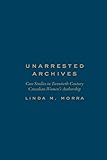Unarrested Archives : Case Studies in Twentieth-Century Canadian Women's Authorship / Linda M. Morra.
Material type: TextPublisher: Toronto : University of Toronto Press, [2014]Copyright date: ©2014Description: 1 online resource (256 p.)Content type:
TextPublisher: Toronto : University of Toronto Press, [2014]Copyright date: ©2014Description: 1 online resource (256 p.)Content type: - 9781442648814
- 9781442617735
- 305.40971 23
- HQ1453 .M674 2014eb
- online - DeGruyter
| Item type | Current library | Call number | URL | Status | Notes | Barcode | |
|---|---|---|---|---|---|---|---|
 eBook
eBook
|
Biblioteca "Angelicum" Pont. Univ. S.Tommaso d'Aquino Nuvola online | online - DeGruyter (Browse shelf(Opens below)) | Online access | Not for loan (Accesso limitato) | Accesso per gli utenti autorizzati / Access for authorized users | (dgr)9781442617735 |
Frontmatter -- Contents -- Acknowledgments -- Introduction -- 1. The Archive of Embodiment: Pauline Johnson’s “A Cry from an Indian Wife” -- 2. Her “Eye” Was Her “I”: Emily Carr, Autobiography, and the Archive of Kinship -- 3. “It’s What You [Don’t] Say”: Sheila Watson, the Imminent Narrative, and the Archive of Displacement -- 4. Jane Rule and the Archive of Activism: Negotiating Imaginative – and Literal – Space for a Nation -- 5. The “Minor” Archive: M. NourbeSe Philip and Mediations of Race and Gender in Canada -- Conclusion -- Notes -- Works Cited -- Index
restricted access online access with authorization star
http://purl.org/coar/access_right/c_16ec
Calling upon the archives of Canadian writers E. Pauline Johnson (1861–1913), Emily Carr (1871–1945), Sheila Watson (1909–1998), Jane Rule (1931–2007), and M. NourbeSe Philip (1947– ), Linda M. Morra explores the ways in which women’s archives have been uniquely conceptualized in scholarly discourses and shaped by socio-political forces. She also provides a framework for understanding the creative interventions these women staged to protect their records. Through these case studies, Morra traces the influence of institutions such as national archives and libraries, and regulatory bodies such as border service agencies on the creation, presentation, and preservation of women's archival collections.The deliberate selection of the five literary case studies allows Morra to examine changing archival practices over time, shifting definitions of nationhood and national literary history, varying treatments of race, gender, and sexual orientation, and the ways in which these forces affected the writers’ reputations and their archives. Morra also productively reflects on Jacques Derrida’s Archive Fever and postmodern feminist scholarship related to the relationship between writing, authority, and identity to showcase the ways in which female writers in Canada have represented themselves and their careers in the public record.
Mode of access: Internet via World Wide Web.
In English.
Description based on online resource; title from PDF title page (publisher's Web site, viewed 01. Dez 2023)


